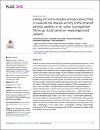Impact of a pharmacist-delivered discharge and follow-up intervention for patients with acute coronary syndromes in Qatar: A study protocol for a randomised controlled trial
| المؤلف | Zidan, Amani |
| المؤلف | Awaisu, Ahmed |
| المؤلف | Kheir, Nadir |
| المؤلف | Mahfoud, Ziyad |
| المؤلف | Kaddoura, Rasha |
| المؤلف | AlYafei, Sumaya |
| تاريخ الإتاحة | 2021-04-22T13:00:30Z |
| تاريخ النشر | 2016 |
| اسم المنشور | BMJ Open |
| المصدر | Scopus |
| الملخص | Introduction: Acute coronary syndrome (ACS) is one of the leading causes of morbidity and mortality worldwide. Secondary cardiovascular risk reduction therapy (consisting of an aspirin, a ?-blocker, an ACE inhibitor or an angiotensin II receptor blocker and a statin) is needed for all patients with ACS. Less than 80% of patients with ACS in Qatar use this combination after discharge. This study is aimed to evaluate the effectiveness of clinical pharmacist-delivered intervention at discharge and tailored follow-up postdischarge on decreasing hospital readmissions, emergency department (ED) visits and mortality among patients with ACS. Methods and analysis: A prospective, randomised controlled trial will be conducted at the Heart Hospital in Qatar. Patients are eligible for enrolment if they are at least 18 years of age and are discharged from any non-surgical cardiology service with ACS. Participants will be randomised into 1 of 3 arms: (1) 'control' arm which includes patients discharged during weekends or after hours; (2) 'clinical pharmacist delivered usual care at discharge' arm which includes patients receiving the usual care at discharge by clinical pharmacists; and (3) 'clinical pharmacist-delivered structured intervention at discharge and tailored follow-up postdischarge' arm which includes patients receiving intensive structured discharge interventions in addition to 2 follow-up sessions by intervention clinical pharmacists. Outcomes will be measured by blinded research assistants at 3, 6 and 12 months after discharge and will include: all-cause hospitalisations and cardiac-related hospital readmissions (primary outcome), all-cause mortality including cardiac-related mortality, ED visits including cardiac-related ED visits, adherence to medications and treatment burden. Percentage of readmissions between the 3 arms will be compared on intent-to-treat basis using ?2 test with Bonferroni's adjusted pairwise comparisons if needed. Ethics and dissemination: The study was ethically approved by the Qatar University and the Hamad Medical Corporation Institutional Review Boards. The results shall be disseminated in international conferences and peer-reviewed publications. |
| اللغة | en |
| الناشر | BMJ Publishing Group |
| الموضوع | non prescription drug beta adrenergic receptor blocking agent dipeptidyl carboxypeptidase inhibitor hydroxymethylglutaryl coenzyme A reductase inhibitor acute coronary syndrome adult Article cardiac patient cardiology service cardiovascular mortality clinical effectiveness controlled study emergency ward female follow up health care delivery hospital discharge hospital readmission human intention to treat analysis major clinical study male outcome assessment patient compliance pharmacist prospective study Qatar randomized controlled trial acute coronary syndrome aged cause of death follow up methodology middle aged mortality risk factor statistics and numerical data very elderly Acute Coronary Syndrome Adrenergic beta-Antagonists Adult Aged Aged, 80 and over Angiotensin-Converting Enzyme Inhibitors Cause of Death Female Follow-Up Studies Humans Hydroxymethylglutaryl-CoA Reductase Inhibitors Male Middle Aged Patient Discharge Patient Readmission Pharmacists Prospective Studies Qatar Research Design Risk Factors |
| النوع | Article |
| رقم العدد | 11 |
| رقم المجلد | 6 |
الملفات في هذه التسجيلة
| الملفات | الحجم | الصيغة | العرض |
|---|---|---|---|
|
لا توجد ملفات لها صلة بهذه التسجيلة. |
|||
هذه التسجيلة تظهر في المجموعات التالية
-
أبحاث الصيدلة [1440 items ]


